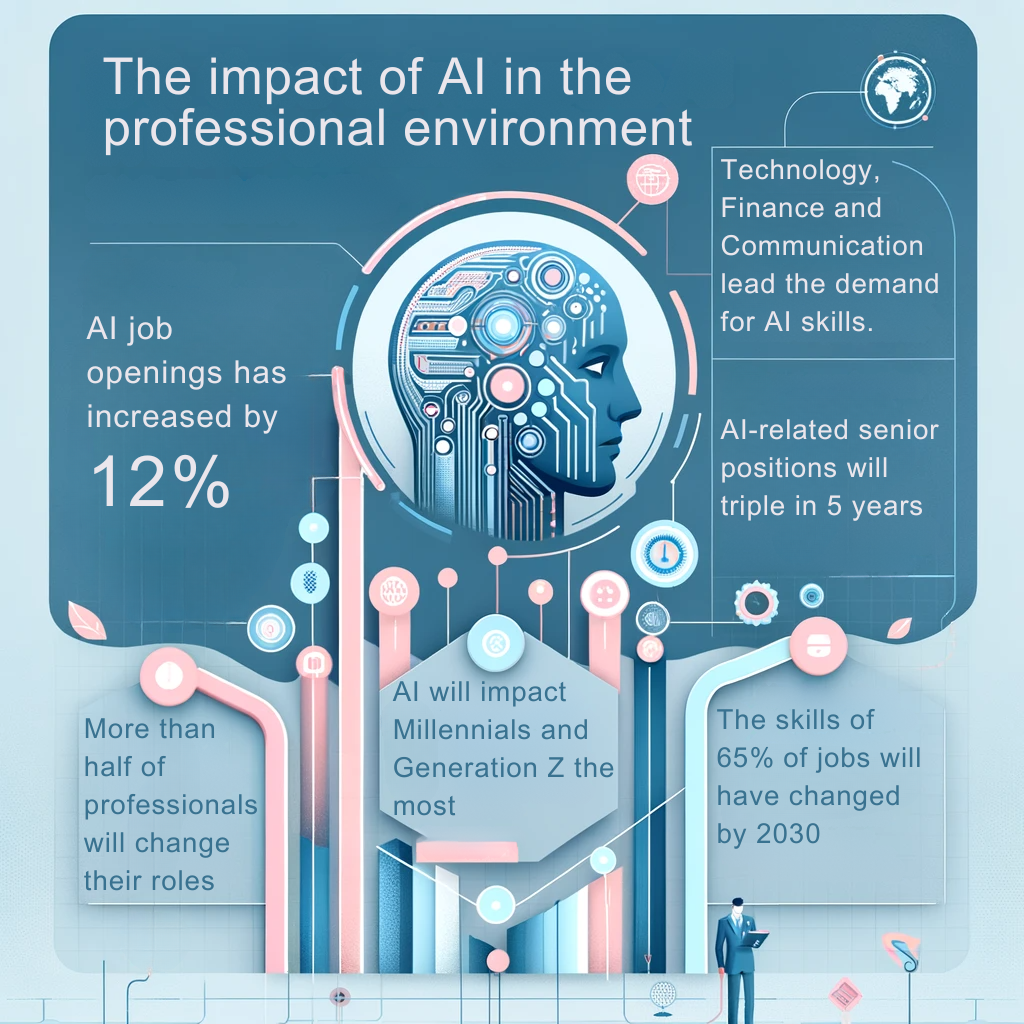Share
It’s no secret, global investment into Artificial Intelligence is skyrocketing. Microsoft recently announced that it will invest £2.5 billion in AI infrastructure and skills in the UK over the next three years. This is in line with the latest projects from Goldman Sachs Economics Research, which says that by 2025, global investment in artificial intelligence will exceed $200 billion.
The Learning & Development (L&D) industry’s curiosity – some may say obsession – with AI and its impact is evident from the number of webinars, articles and industry-discussions that are popping up. One such example, at a recent LPI webinar with Udemy Business, shared these revealing statistics and insights:
“Generative AI is reshaping the work landscape with McKinsey predicting up to 30% of work hours will be automated by 2030.
While employee development remains crucial, staying ahead of competitors and harnessing this AI revolution are now compelling reasons to establish a robust skills strategy.
82% of the global leaders Microsoft surveyed said that their employees will need new skills to be prepared for the growth of generative AI.”

How is AI changing our professional profiles?
But it’s not just industry discussions which are happening, research is also being carried out to in order to help gauge its impact and we’re especially interested in the impact it’ll have on skills and training. One such study by Skillsoft, an American company in the e-learning sector, spoke to 350 professionals in the UK and Germany. The statistics they discovered are eye-opening and highlight the great opportunity that organisations have to invest in developing AI skills for their employees.
They found out:
- 96% of respondents anticipate a profound influence of AI on job roles.
- Only 37% have received relevant training.
- In the UK, 63% said they need relevant training.
- In Germany, 20% perceive AI as a gap in professional skills.
This data reflects that there is already a widespread awareness of the transformative power of artificial intelligence in certain industries. But they also show that we are facing a great opportunity for organisations to invest in relevant training for their employees.
The L&D sector faces the challenge of closing the AI training gap and developing a balanced learning strategy, one that encompasses both technical skills and soft skills. It is crucial for companies to cultivate an AI-savvy workforce, which ensures the company’s competitiveness and takes advantage of the transformative potential of this technology. This implies significant investment in comprehensive training initiatives and continuous adaptation to an ever-changing labour market. This is the only way to prepare the leaders of the future… and the present.

The future is now
We can’t deny it, AI is in our present. It’s no longer something ‘in the future’, it is in the here and now and it is already changing our professional environment. LinkedIn recently published the report The Future of Work: AI at Work, which shows relevant data on how artificial intelligence has impacted, and interrupted, our professional lives.
Here are some numbers:
- Conversations about AI have skyrocketed 70% on LinkedIn in the last year.
- Views of AI-related jobs have increased by 12%.
- The demand for AI-related skills has increased the most in Technology, Finance, Media, Retail and Professional Services sectors.
- More than half of professionals globally will experience changes in their jobs as a result of AI.
- Professionals with undergraduate and graduate degrees face a high level of disruption as a result of AI: 55% and 52% respectively.
- The skills needed to qualify for a job will change by up to 65% by 2030.
- AI-related positions of responsibility will triple in the next 5 years.
- Professionals with ‘soft’ skills will progress 13% faster in their careers.
- Gen Z and Millennials perceive a great impact of AI on their careers.
So, what does this mean for L&D teams? In short, they should take note of all these changes as they can play a big part, and lead the way in upskilling workforces in AI, helping to transform and adapt current roles. They would be wise to draw up business cases for investment in training programmes that address AI, in order to stay competitive in their industry.
In short, L&D should take note of all these changes as they can play a big part, and lead the way in upskilling workforces in AI, helping to transform and adapt current roles.
It is time to integrate AI into L&D strategies
Artificial intelligence is already making its mark on learning. It’s being used to improve the quality and efficiency of learning, making it more inclusive, accessible and personalised. It is also being used to help create content, such as the use of AI translation tools, or ChatGPT to do research or draft ideas.
On the business front, it is also a game changer, transforming the way organisations train their employees. We’re not just talking about improving efficiency, we’re talking about enriching the learning experience.
But in a global landscape where investment in artificial intelligence is increasing exponentially, the L&D industry have to decide their place in this reality. As we’ve briefly illustrated, it isn’t just a future possibility; its influence is well underway to transforming the way we teach and learn, and our goals and aspirations as L&D need to match this picture. Organisations must carefully evaluate when and how to adopt this technology. We are facing a fundamental shift in corporate training, and the question we need to ask ourselves is: are we ready to embrace this change and make the most of its potential?
Share

